INTERVIEW: FIRE & DUST MEETS JEFF COTTRILL
Jeff Cottrill is a fiction writer, journalist and spoken-word artist based in Toronto, Canada. He has also been the Literary Editor of Burning Effigy Press. Jeff’s performance style is influenced by slam conventions, which he subverts with wit, ironic humour and a satirical tone. He has headlined in countless literary series throughout Canada, the UK, the US, France and Ireland over the last twenty years. Across 2021, he has been featured in the poetry podcasts Wordsmith (Australia) and Poets and Muses (US) and had short fiction and poems published in The South Shore Review and The Dreaming Machine. This year also saw his work published in several international anthologies, including Paper Teller Diorama, Sinew: Ten Years of Poetry in the Brew and Globalisation: The Sphere Keeps Spinning. He is currently nominated for a Pushcart Prize for his poem “This Is Not Real Poetry,” which appeared in the 2021 Brownstone Poets anthology. Jeff has authored four chapbooks and recorded three CDs, and his first novel, Hate Story, is coming soon from Dragonfly Publishing.
On 9th December 2021, Jeff was the headliner at our virtual Fire & Dust poetry gig. We caught up with him after the gig, to ask a few questions…
HCE: Tell us a little about your journey as a writer so far. Is it true you started writing fiction at the age of six?
JC: I remember writing lots of stories and poems in school, starting in the first grade. Sometimes they were just straight rip-offs of comedy sketches I’d seen on TV. I became more serious about writing fiction late in high school, and I had a few encouraging teachers. Then I joined a terrible creative writing program in university, in which they expected everybody to emulate Hemingway or Ondaatje, and that shattered my confidence for years.
Spoken word was something I stumbled into when I started reading older stories at open mics and discovered the performance aspect of poetry from other readers. I decided I wanted to do the same thing, but with a different style – combining poetry with aspects of comedy, theatre, and/or storytelling. So I’ve stuck with that for more than two decades, performing both locally and internationally, and I’ve also returned to fiction in the last few years.
HCE: Plenty of creatives try to be funny and fail, while you clearly have a gift for it. Your style of humour could have found a home in the world of comedy or other performative arts – what drew you to poetry in particular?
JC: I’ve always thought of myself as a writer first, be it stories or poetry or sketches. So, I consider myself a funny writer (in the tradition of Twain or Vonnegut or Douglas Adams, but without their genius) rather than a comedian. I never thought I’d be good at stand-up because of the pressure of hitting the mark every time with constant punchlines, tailored specifically to an audience. In poetry, they don’t necessarily expect you to be funny, so it’s a bonus when you score laughs, and it gives me the freedom to do what I think is funny, without having to dumb it down.
I did study improv and sketch writing with Second City for a few years. It was all lots of fun, although I often felt the writing classes were trying to teach a Second City-style formula, whereas I wanted to indulge in Pythonesque leaps of absurdity that didn’t always hit.
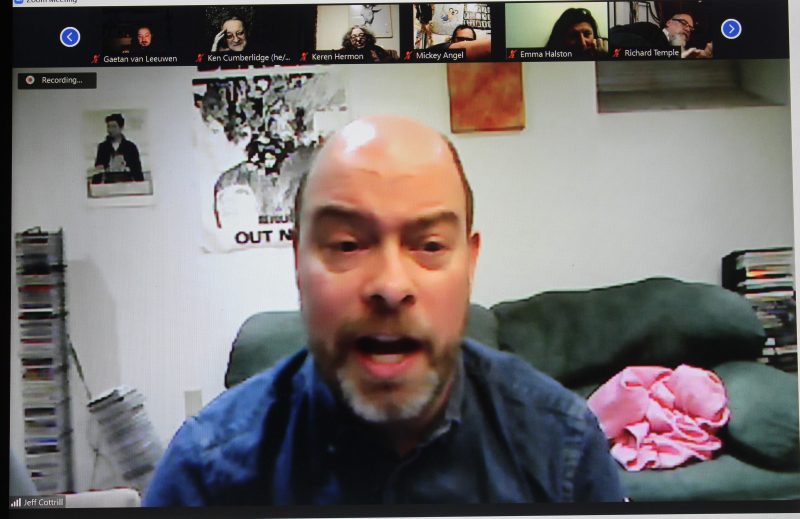
HCE: Would you say there are themes or motifs that you tend to gravitate to in your work?
JC: Anything that pisses me off, I guess. It can range from politics or social trends to some nasty remark somebody said. I think I tend to satirize bullies a lot – but to me, bullies come in many forms. They can be right-wing corporate suits, or left-wing social-justice mobs, or terrible parents, or cold government officials, or even just hypocritical friends.
HCE: Talk us through your writing process a little. Does the real-world topic you want to explore come first and you write around it, or does the clever concept/imagery come first and you decide what topic it will suit best, or…?
JC: The real-world topic usually comes first, and then the words come from that. Sometimes they’ll come to me when I’m out for a walk or something, and I’ll write half the piece in my head before I get to a word processor. Sometimes it’ll come out of free writing in a workshop. Sometimes I’ll get the general idea or theme first, but struggle for a while as to how to express it best in words.
HCE: Who or what would you say are the biggest influences on your poetry?
JC: Mark Twain and Kurt Vonnegut are among my literary heroes, as well as Dickens (though I’ve been mocked for that). I also admire the great eighteenth-century satirists like Swift, Pope, and Voltaire. And the U.K. has some wonderful comedic performance poets whom I continue to learn from – A.F. Harrold, for one. But I also get ideas from other art forms – sketch comedy, music, theatre, film. I’d be lying if I denied that Monty Python and Tom Stoppard and Chuck Jones and The Simpsons were heavy influences too, and “Weird Al” Yankovic definitely taught me a lot about how to write parody.
HCE: Poetry can often be an overtly gloomy/angry artform. It’s refreshing how most of your poems are reflections of our dark world, where it feels like everything is going to shit some days, while also being funny. What influenced your decision to approach serious – and even bleak – topics this way, i.e. threading in the issues amongst big laughs? Do you feel audiences respond better to a message that is irreverently packaged, rather than when poets are sanctimonious?
JC: Some poets do the sanctimonious thing really well, and I can admire that from a distance. But humour is really a great way to get unpleasant truths across. As Oscar Wilde said, if you want to tell people the truth, make them laugh, or they’ll kill you. It’s like a sugar-coated pill. One of the reasons I admire Vonnegut so much is the way he could make you laugh about extremely dark subjects – and not in a tasteless way, like Mel Brooks or South Park would do (although I respect them too).
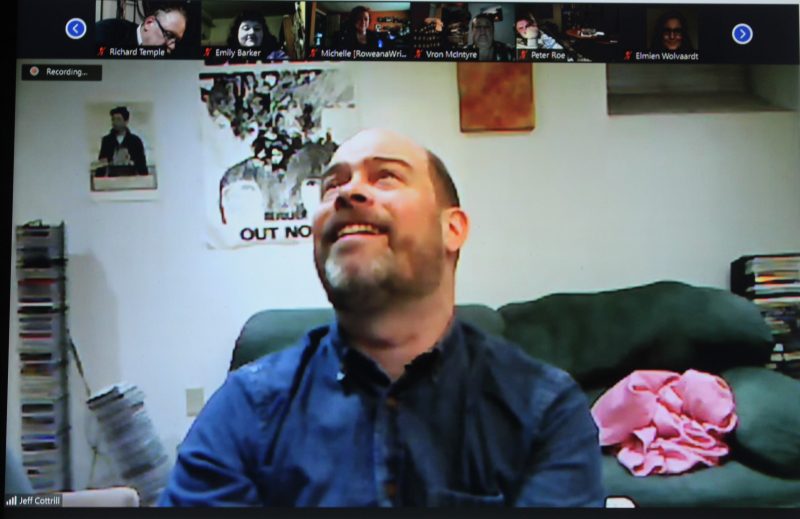
HCE: How important to you is structure when it comes to crafting poems, particularly the ones for performing aloud? We ask because stand-up comedians tend to be entirely focused on building up to their punchlines whereas, with your poetry, the audience usually needs to grasp the overall premise early on and be willing to go along for the ride.
JC: For me, punchlines are rarely the real focus. It’s about building the structure out of a character or a premise and then having the jokes and callbacks come out of that naturally, rather than forcing the jokes. It’s important to start with a good idea and a strong point of view, and then explore what’s absurd or contradictory about the topic.
HCE: Do you tend to segregate your work into ‘written for the page’ and ‘written for the stage’? For instance, is it an easy or difficult task to decide which poems go into chapbooks and which are destined for a spoken word album?
JC: About ninety-nine percent of what I do is written for the page first. If I feel that it has high dramatic potential and if it gets good audience feedback, then I’ll develop it into a performance piece, memorizing it if I have the time. Some poems and pieces adapt better to performance than others; you don’t always know at first.
HCE: What sort of journalism are you interested in, and does it provide lots of material for the poetry? And are poetic habits a help or hindrance when it comes to writing non-fiction?
JC: Most of what I’ve done is arts reviews, especially film and theatre. But I did work full-time for four years at a magazine about occupational health and safety, which turned out to be a broad field, and I wrote feature stories on every relevant subject from pot legalization to rail disasters. It’s always been separate from my fiction and poetry work; rarely do they influence each other or get in the way.
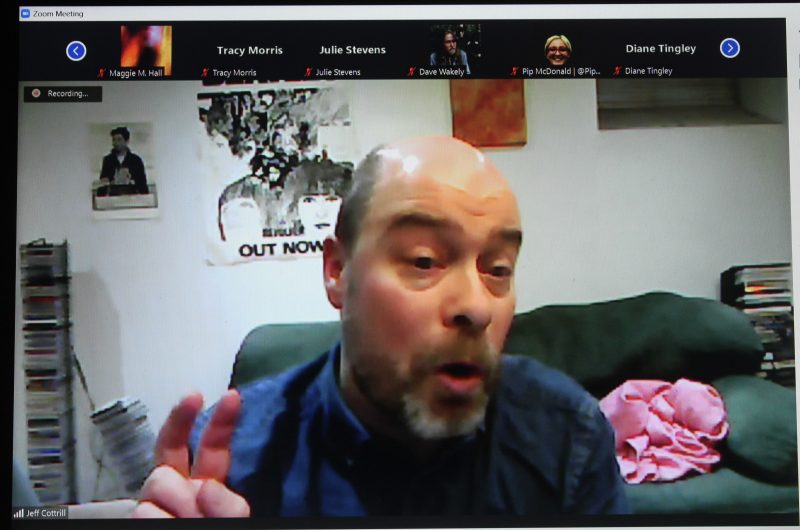
HCE: Would you say it takes more courage to perform satire now, in these times of cultural hypersensitivity, or have you found poetry audiences are grateful to be invited to laugh and stretch their critical faculties?
JC: Cultural hypersensitivity is definitely a barrier, but a skilled satirist knows how to flirt with the boundaries without going too far. Sometimes it’s hard to tell where that line is, and you never know what’s going to trigger someone. People have subjected me to Mel Gibson-like levels of rage and fury for lines and jokes that I thought were fairly mild and harmless, like the last line in “A Love Letter.” On the other end, I thought “If It Happened Now” was going to upset people – but the only person who complained was a Facebook troll who said I was trying way too hard to be offensive and failing.
Satire probably requires more courage now. I don’t want to come off as another one of those “omg political correctness iz ruinin comedy!!!!!!!!1!” guys, but I’m amazed at how some people just don’t get the basics of irony and satire these days. Critical thinking and nuance appear to be dead. Part of it is that people are afraid to say what’s on their minds for fear of being misunderstood and then publicly shamed online. But the whole goal of satire is to topple sacred cows, and that’s why it’s needed more than ever now. We have too many damn cows.
That said, people from Zoom events tell me they’re drawn to my stuff largely because it’s a refreshing change from the usual poetic styles.
HCE: Has it been more difficult connecting with audiences on Zoom? You must need to tap into humour and references that resonate across a more diverse and international set of funny-bones.
JC: I’ve had no problems connecting with Zoom audiences. I may even do better there than in live gigs, for some reason. There are a few of my older pieces, like “An Ode to the Moon” and “Greedo,” that received little or no response when I read/performed them live in Canada, but have gone over well on Zoom. I don’t know why.
As I’ve been performing internationally since 2005, I’m already in the habit of tweaking references to appeal more universally. I have different versions of “Like Poem” for Canadian and British audiences, for example (I change “Kraft Dinner” to “macaroni and cheese”). And there are a few that are so full of Canuck references that I don’t even bother with them over Zoom.
Canonical literary and cultural references tend to travel well too, since these works are known near-universally, and I have more than my share of those references.
HCE: Did working in publishing, where you experience things from the other side of the industry, give you any useful insights as a writer?
JC: It definitely showed me the other side of the gatekeeping line. I volunteered with a small press in Toronto for the better part of a decade, and I’ve worked as an editor for magazines. You always get so many submissions that you couldn’t possibly have time to read, from aspiring authors or journalists. When you reject or ignore them, it’s often because they don’t fit the specific vibe of the publication, not necessarily because they’re “bad.” So the experience humanised the folks on the other side for me.
HCE: What type of poetry do you seek out for personal enjoyment? As a reader/listener, when you engage with a poet’s work, what are you hoping to get out of it?
JC: I read and listen to all kinds of poetry. An advantage of attending as many events as I have is exposure to a wide range of styles and themes. I tend to respond most to poets whose language isn’t too obscure, but who also aren’t going for flash over substance. I like a blend of art and entertainment, not just in poetry, but in all art forms.
When I started doing spoken word in Toronto (before slam ate the scene up), the local names I admired included Monica S. Kuebler, Cynthia Gould and Wakefield Brewster – whom I also counted as friends. Touring the U.K. over the years introduced me to fine work by A.F. Harrold, Jackie Hagan, Dominic Berry and Niall O’Sullivan. And over Zoom, I’ve come to enjoy the work of Special K, Skylar Wynter, Kelly van Nelson, Clive Oseman, Natalie Scott, Leanne Moden, Elizabeth McGeown and many others.
In terms of “classic” literary poets, though, my favourites include Shakespeare, Pope, and Keats.
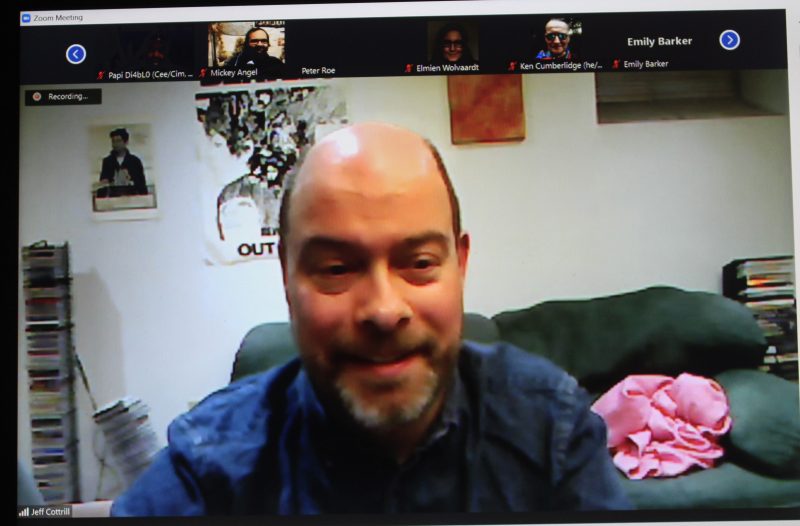
HCE: What’s next on the horizon for you? Are you planning to launch Hate Story in 2022, and are you already booked for some upcoming performances?
JC: Hate Story has just been accepted by Dragonfly Publishing, a press in Perth, Australia. It should be available by the end of February in paperback and e-book, through Amazon, Barnes & Noble, Waterstones and other online booksellers. I plan to hold a Zoom launch party with an international line-up of opening acts, likely in March.
I’m featuring in Gestalt Poetry (based in Nashville) on February 26. This is going to be a hybrid show (i.e. both live and on Zoom). I was really hoping to fly to Nashville and do the gig in person, but Omicron is making that unlikely at this point, so it looks like another Zoom appearance. Otherwise, I’m just accepting whatever opportunities come my way.
HCE: You’ve engaged enthusiastically with the virtual poetry scene across the pandemic. What would your top piece of advice be, for poets who love open mics but find it a challenge to perform at online gigs?
JC: Just do it. It’s really the same thing as live performances, just in a different format. If you’re a slam or performance poet, one advantage is that you don’t feel pressure to memorize new work – you can just read it off the computer screen.
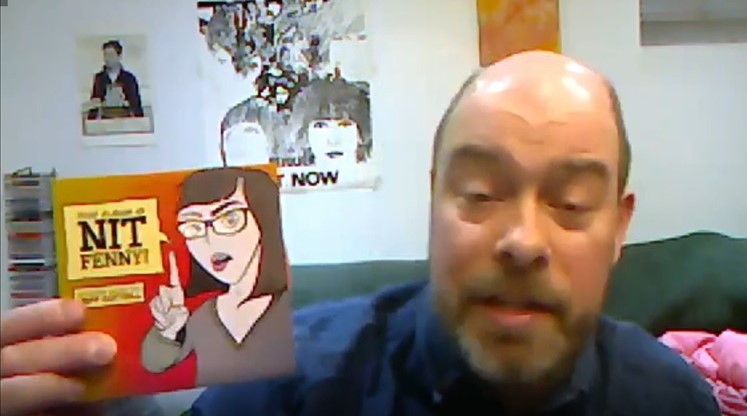
HCE: What’s the best way for people to keep connected with you and your work, or contact you for bookings?
Website Facebook Twitter Wattpad
Visit Jeff’s website for details of how to purchase spoken word CD This Album Is NIT FENNY!, and join this Facebook group to stay updated about Hate Story.
